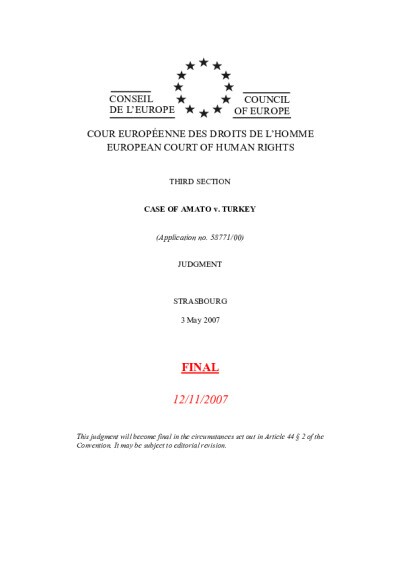
Date
Geographical Area
Europe
Countries
Turkey
Keywords
Jurisdiction
European Court of Human Rights (ECHR)
Case Name
Amato v. Turkey
Case Reference
no. 58771/2000
Name of Court
European Court of Human Rights
Key Facts
In 1962 following a major rockslide, the Council of Ministers declared the neighbourhood of Asansör in Izmir a ‘natural disaster area’. A regulation was published giving victims of the disaster an opportunity to apply for rehousing. The owner of the house in question did not apply for rehousing at the time and was subsequently served an eviction order.
In 1994, Mr Amato bought the house in question. According to the documents submitted by the Government, the house was in ruins. Following heavy rain in January 1995, rocks fell on a nearby house. A report concluded that eleven houses needed to be demolished to prevent loss of life. On 12 January 1995, the applicant’s house was demolished without prior notification.
The İzmir Administrative Court dismissed the applicant’s application for compensation. Since the title-deeds stated that no construction was permitted in the Asansör neighbourhood, he should have been aware of this situation when he bought the house. By demolishing the vacant house, that had no historical or architectural value, and which posed an immediate threat to public safety, the administration had acted in accordance with the law. The Supreme Administrative Court upheld this decision and held the Izmir Governor’s Office had delivered the demolition order because there was an urgent need to take action to prevent loss of life in the neighbourhood.
In 1994, Mr Amato bought the house in question. According to the documents submitted by the Government, the house was in ruins. Following heavy rain in January 1995, rocks fell on a nearby house. A report concluded that eleven houses needed to be demolished to prevent loss of life. On 12 January 1995, the applicant’s house was demolished without prior notification.
The İzmir Administrative Court dismissed the applicant’s application for compensation. Since the title-deeds stated that no construction was permitted in the Asansör neighbourhood, he should have been aware of this situation when he bought the house. By demolishing the vacant house, that had no historical or architectural value, and which posed an immediate threat to public safety, the administration had acted in accordance with the law. The Supreme Administrative Court upheld this decision and held the Izmir Governor’s Office had delivered the demolition order because there was an urgent need to take action to prevent loss of life in the neighbourhood.
Decision and Reasoning
The applicant claimed the demolition of his house amounted to a violation of Article 1, Protocol No.1 ECHR, arguing every person is entitled to the peaceful enjoyment of his possessions, so he should have received compensation for the loss sustained.
The Court noted any interference with the peaceful enjoyment of possessions must strike a fair balance between general interests of the community and the requirement of protection of the individual’s fundamental rights. There must be a relationship of proportionality between the means employed and the aim sought. The Court held that the deprivation of property was lawful and pursed a legitimate aim, namely the need to protect public safety.
The Government of Turkey argued no compensation was due since the title deeds stated no construction was permitted and the previous owners had not applied for re-housing. The Court held that the submissions of the Government did not justify a total lack of compensation and that a balance had not been struck between the protection of property and the requirements of the general interest. The Court held that there had been a violation of Article 1, Protocol No 1.
The Court noted any interference with the peaceful enjoyment of possessions must strike a fair balance between general interests of the community and the requirement of protection of the individual’s fundamental rights. There must be a relationship of proportionality between the means employed and the aim sought. The Court held that the deprivation of property was lawful and pursed a legitimate aim, namely the need to protect public safety.
The Government of Turkey argued no compensation was due since the title deeds stated no construction was permitted and the previous owners had not applied for re-housing. The Court held that the submissions of the Government did not justify a total lack of compensation and that a balance had not been struck between the protection of property and the requirements of the general interest. The Court held that there had been a violation of Article 1, Protocol No 1.
Outcome
The Court unanimously declared the application admissible. There had been a violation of Article 1, Protocol No.1. There was no need to examine separate complaints under Article 6 (right to a fair hearing). The respondent State was to pay the applicant €1,500 in respect of pecuniary damage and €1,000 in respect of costs and expenses.
Link
Disclaimer
This case law summary was developed as part of the Disaster Law Database (DISLAW) project, and is not an official record of the case.
Document
Document